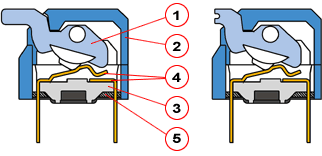|
RPL / RP Series
|
 |
|
RPL series
|
|
RP series
|
|
|
-
Terminal plating by gold gives excellent results when soldering.
-
RPL series (raised actuator) and RP series (recessed actuator)
-
Low contact resistance, and self-clean on contact area.
-
Double contacts offer high reliability.
-
All materials are UL94V-0 grade fire retardant plastics.
|
|
ITEM |
Description |
Materials |
Treatment |
|
1 |
Actuator |
UL94V-0 PBT |
White |
|
2 |
Cover |
UL94V-0 PBT |
Blue, Red, Black |
|
3 |
Base |
UL94V-0 PBT |
Black |
|
4 |
Terminal |
Phosphor bronze |
Gold Plating |
|
5 |
Potting |
Epoxy |
Black |
|
PROD NO. |
NO. OF POS |
DIM A |
|
|
RPL/RP-02 |
02 |
6.26 |
0.246 |
|
RPL/RP-03 |
03 |
9.06 |
0.357 |
|
RPL/RP-04 |
04 |
11.34 |
0.446 |
|
RPL/RP-05 |
05 |
13.88 |
0.546 |
|
RPL/RP-06 |
06 |
16.42 |
0.646 |
|
RPL/RP-08 |
08 |
21.5 |
0.846 |
|
RPL/RP-10 |
10 |
26.58 |
1.046 |
|
RPL/RP-12 |
12 |
31.60 |
1.244 |
| Example:
|
RPL-08-B-T is a Piano Type Dip Switch, Long key, 8 position with top tape sealed. |
| PACKING |
All Dip Switches are shipped in standard IC tubes with all poles in "OFF" position. |
|
 |
Electrical life: 2000 operation cycles per switch 24VDC, 25mA.
Non-Switching Rating: 100mA, 50 VDC
Switching Rating: 25mA, 24VCD. |
| Contact resistance: |
(a) 50mΩ max. at initial
(b) 100mΩ max. after life test. |
Insulation resistance: 100MΩ min. (at 500VDC)
Dielectric Strength: 500VAC/1 minute.
Capacitance: 5pF max.
Circuit: Single pole single throw. |
Mechanical life: 2000 operations per cycle switch
Operation Force: 400gf max.
Stroke: 2.0mm
Operation Temp: -25° C to +70° C
Storage Temp: -40° C to +85° C |
| Vibration Test: |
MIL-STD-202F METHOD 201A
Frequency: 10-55-10Hz/1 min
Directions: X, Y, Z, three mutually
perpendicular directions.
Time: 2 hours each direction.
High reliability. |
| Shock Test: |
MIL-STD-202F METHOD 213B.
CONDITION A
GRAVITY: 50G (peak value), 11 m/sec.
Direction and times: 6 sides and three times in
each direction. High reliability. |
| SOLDERING AND CLEANING PROCESSES |
| For best results, please follow these recommendations: Keep all switch contacts in their "OFF" position for all operations. |
| WAVE SOLDERING: Recommended solder temperature at 500 F (260° C) max. 5 seconds. |
| HAND SOLDERING:
|
Use a soldering iron of 30 watts, controlled at 608 F(320° C) approximately 2 seconds while applying solder. |
| CLEANING PROCESS:
|
Flux clean using force rinse, high agitation or triple bath cleaning method. Freon TF or TE give excellent results. When vapor methods are used, do not subject the switch to solvents at temperatures above 125
F (51° C). |
|